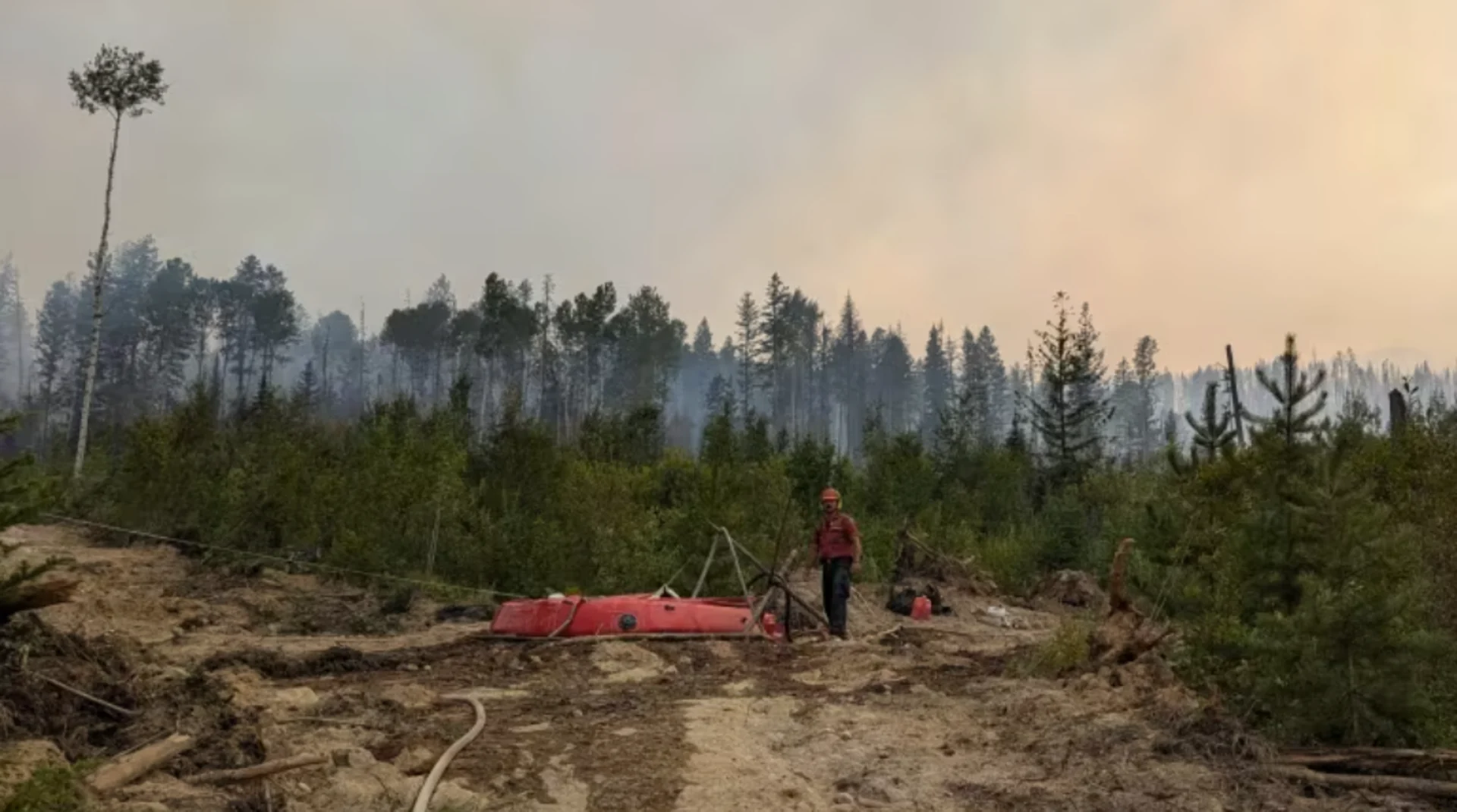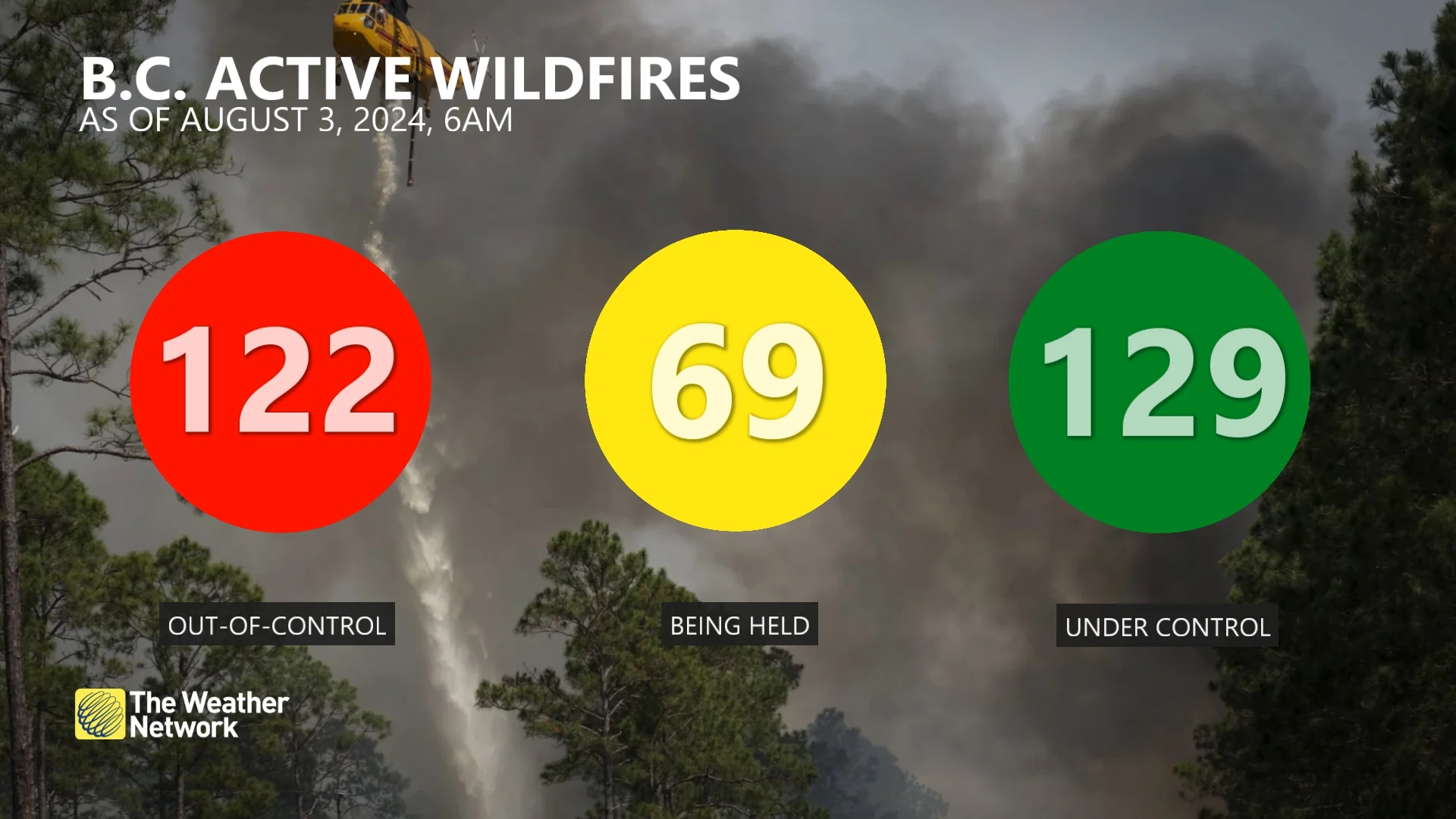
2 new wildfires of note in southern B.C. as hot, dry spell begins
The B.C. Wildfire Service says it now considers eight of the more than 320 fires burning across the province as wildfires of note as crews prepare for hot and dry conditions in the south of the province over the long weekend.
The Dunn Creek fire, about 100 kilometres north of Kamloops, and the Sitkum Creek fire northeast of Vernon were added to the list of wildfires of note, a designation meaning they are either highly visible or pose a threat to public safety or infrastructure.
Kamloops Fire Centre information officer Taylor Shantz said both fires are highly visible, but neither poses a risk to infrastructure at this time.

She said crews working on the Sitkum Creek wildfire are digging away long lines of organic material to "box in" and contain the flames this weekend, while mapping in recent days has given crews a better understanding of the Dunn Creek wildfire's boundaries.
CANADA'S WILDFIRES: Visit The Weather Network's wildfire hub to keep up with the latest on the active wildfire season across Canada.
Evacuation orders have been in place for areas around both fires since last week.
Hot and dry, smoke and lightning
The BCWS says a "drying trend" in the south is underway after a couple of days of high temperatures and no rain, conditions that are expected to make forest fuels more susceptible to burning.
Environment Canada has issued more than 20 heat warnings in the province, saying an "extended period" of hot weather is expected for much of the southern Interior covering the Fraser Canyon, the Okanagan Valley, the South Thompson, Boundary, the West and East Kootenays, and several other parts of B.C. including Howe Sound, eastern Vancouver Island and the North and Central coasts.
Emelie Peacock with the BCWS said the service is expecting to see an increase in thunderstorms and lightning strikes — a major cause of wildfire ignitions — throughout southern B.C. starting Friday afternoon.
She added smoke drifting north from California wildfires could affect the wildfire response.
"It could challenge our aerial resources' ability to work on wildfires due to visibility and safety concerns," she said.

"On the positive side, the smoke that's drifting up has a potential to cool down temperatures and that could possibly result in dampening that thunderstorm activity."
The BCWS says the north, where a campfire ban has been lifted in time for the long weekend, will be hit with thunderstorms and rain.
4 homes destroyed near Golden
The Town of Golden says four homes to the south of the community were destroyed last week by the Dogtooth Forest Service Road wildfire.
In a news release Friday, a spokesperson for the B.C. Rockies town, located about 200 kilometres east of Kamloops, said a total of 15 structures, including the homes, were lost to the fire on July 24.
SEE ALSO: Colorado wildfire blamed for one death as California blaze expands
"My deepest sympathies go out to those who have experienced the loss of their homes south of town," Golden Mayor Ron Oszust said in the release.
The Dogtooth FSR wildfire, a wildfire of note, was discovered on July 22 and spurred evacuation orders for 107 properties south of Golden and the community of Parson.
Twenty properties near Parson remain on evacuation order, while more than 1,000 in the area are on evacuation alert due to the fire, which was burning over an area of almost 54 square kilometres as of Friday afternoon.
Almost 40 per cent of the active fires in B.C. are deemed out of control, according to the BCWS. Nearly 1,700 firefighters are responding to the fires alongside 189 aircraft.
Researchers expect human-caused climate change to drive more hot and dry weather.
Thumbnail image credit to the B.C. Wildfire Service.
This article was originally written by and published for CBC News on Friday, Aug. 2, 2024. With files from The Canadian Press.










